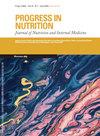Investigation of the effect of COVID-19 pandemic on employees' psychological symptoms and nutritional habits
4区 医学
Q4 Agricultural and Biological Sciences
引用次数: 0
Abstract
Background: It is anticipated that the fear caused by the possible consequences of Covid-19 virus transmission and the sense of restraint caused by control applications such as quarantine may affect individuals', especially employees' psychological parameters and change their habits. Objectives: The aim of this study is explaining the effect of pandemic conditions and precautionary practices on the psychological parameters and nutritional habits of employees. Methods: In this direction, The SCL-90-R test, which was applied to 400 office workers before the pandemic, was reapplied during the pandemic period and the differences between the psychological symptoms were evaluated statistically. In addition, a mini questionnaire was applied on the change of daily nutritional habits after the pandemic. Results: In the period of pandemic compared to before the pandemic;a definite statistical difference was determined in somatization, interpersonal sensitivity, depression, anxiety, phobic anxiety, paranoid, and general symptom index symptoms. In addition, an acceptable difference was found for the increase in symptoms of paranoid ideation and obsessive-compulsive, and there was no statistical difference only in symptoms of hostility and psychoticism. In addition, it was found that the majority of the participants experienced a change in their daily eating methods. Conclusion: The increase in almost all of the psychological parameters is not evidence of psychological diseases. However, according to the average results, the parameters closest to evaluation as a problem comply with the observed behaviors in pandemic conditions. The change in nutrition methods is also thought to be a reflection of the psychological factors that changed during the pandemic period. © 2021 Mattioli 1885. All rights reserved.新冠肺炎疫情对员工心理症状及营养习惯影响的调查
背景:预计由于新冠病毒传播可能产生的后果而产生的恐惧,以及隔离等控制措施所产生的克制感,可能会影响个人,特别是员工的心理参数,改变他们的习惯。目的:本研究的目的是解释流行病条件和预防措施对员工心理参数和营养习惯的影响。方法:在此方向上,对疫情前400名办公人员进行SCL-90-R测试,并在疫情期间重新进行测试,统计评估心理症状的差异。此外,还对大流行后日常营养习惯的变化进行了小型问卷调查。结果:大流行期间与大流行前相比,躯体化、人际敏感、抑郁、焦虑、恐惧焦虑、偏执、一般症状指数等症状有明显的统计学差异。此外,在偏执观念和强迫症症状的增加上发现了可接受的差异,只有敌意和精神病症状没有统计学差异。此外,研究发现,大多数参与者的日常饮食方式发生了变化。结论:几乎所有心理指标的升高不是心理疾病的证据。然而,根据平均结果,最接近作为问题进行评估的参数符合在大流行条件下观察到的行为。营养方法的变化也被认为是大流行期间心理因素变化的反映。©2021 Mattioli 1885版权所有。
本文章由计算机程序翻译,如有差异,请以英文原文为准。
求助全文
约1分钟内获得全文
求助全文
来源期刊

Progress in Nutrition
医学-营养学
CiteScore
1.40
自引率
0.00%
发文量
0
审稿时长
>12 weeks
期刊介绍:
Progress in Nutrition was founded in 1999 as an independent magazine, a multidisciplinary approach, dedicated to issues of nutrition and metabolism.
 求助内容:
求助内容: 应助结果提醒方式:
应助结果提醒方式:


